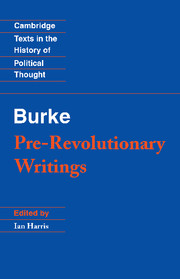Book contents
- Frontmatter
- Contents
- Preface
- Acknowledgements
- Abbreviations
- Chronological table
- Introduction
- A note on the texts
- Biographica
- Bibliography
- ‘Extempore Commonplace on The Sermon of Our Saviour on the Mount’
- A Vindication of Natural Society
- A Philosophical Enquiry into the Origin of our Ideas of the Sublime and Beautiful
- ‘Religion’
- Tracts on the Popery Laws
- Thoughts on the Cause of the Present Discontents
- Conciliation with America
- ‘Almas Ali Khan’
- ‘Speech on the Army Estimates’
- Index of persons
- Index of subjects and places
- Cambridge Texts in the History of Political Thought
‘Almas Ali Khan’
Published online by Cambridge University Press: 05 June 2012
- Frontmatter
- Contents
- Preface
- Acknowledgements
- Abbreviations
- Chronological table
- Introduction
- A note on the texts
- Biographica
- Bibliography
- ‘Extempore Commonplace on The Sermon of Our Saviour on the Mount’
- A Vindication of Natural Society
- A Philosophical Enquiry into the Origin of our Ideas of the Sublime and Beautiful
- ‘Religion’
- Tracts on the Popery Laws
- Thoughts on the Cause of the Present Discontents
- Conciliation with America
- ‘Almas Ali Khan’
- ‘Speech on the Army Estimates’
- Index of persons
- Index of subjects and places
- Cambridge Texts in the History of Political Thought
Summary
Introduction
Whilst Burke's interest in India was excited and, indeed, partially sustained by his connections, personal and political, the mind he applied to it was furnished with the doctrine and experience he had accumulated. Reflecting on India combined many facets of his thought and the combination was creative. For whilst it would be easy for the superficial reader to see in Burke on India merely another variation on the theme of conquest, it was more besides. His sympathies were extended to embrace a civilization different from the British; and because he conjured with a devastation in India far more terrible than the handicaps to liberty and improvement he had conceived in Ireland, England and America, his mind was focussed upon the foundations of society.
The Rockinghams took up Indian issues as a way of harrassing North's government during the later 1770s. In 1776 Lord Pigot, governor of Madras, was deposed illegally from his office by a cabal comprising discontented servants of the East India Company and a native ruler, Muhammed Ali (better known to history as the Nawab of Arcot). The components of this situation reflect the state of Britain's role in India. The Company was the principal agency of Britain's penetration of the sub-continent. The Company's primary aim was commercial, but commerce soon became inseparable from political affairs.
- Type
- Chapter
- Information
- Pre-Revolutionary Writings , pp. 270 - 297Publisher: Cambridge University PressPrint publication year: 1993



